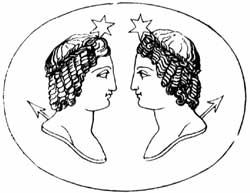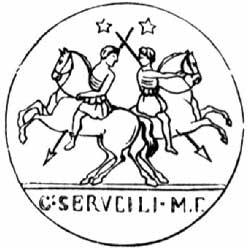Dioscuri
That is, sons of Zeus, the well-known heroes, Castor and Pollux, or Polydeuces. The singular form Dioskouros (Διόσκουρος) or Dioskoros (Διόσκορος), occurs only in the writings of grammarians, and the Latins sometimes use Castores for the two brothers.1
According to the Homeric poems2 they were the sons of Leda and Tyndareus, king of Lacedaemon, and consequently brothers of Helen.3 Hence they are often called by the patronymic Tyndaridae.4 Castor was famous for his skill in taming and managing horses, and Pollux for his skill in boxing. Both had disappeared from the earth before the Greeks went against Troy. Although they were buried, says Homer, yet they came to life every other day, and they enjoyed honors like those of the gods. According to other traditions both were the sons of Zeus and Leda, and were born at the same time with their sister Helen out of an egg,5 or without their sister, and either out of an egg or in the natural way, but in such a manner that Pollux was the first born.6 According to others again, Polydeuces and Helen only were children of Zeus, and Castor was the son of Tyndareus. Hence, Polydeuces was immortal, while Castor was subject to old age and death like every other mortal.7 They were born, according to different traditions, at different places, such as Amyclae, Mount Taygetus, the island of Pephnos, or Thalamae.8

The fabulous life of the Dioscuri is marked by three great events:
1. Their expedition against Athens. Theseus had carried off their sister Helen from Sparta, or, according to others, he had promised Idas and Lynceus, the sons of Aphareus, who had carried her off, to guard her, and he kept her in confinement at Aphidnae, under the superintendence of his mother Aethra. While Theseus was absent from Attica and Menestheus was endeavoring to usurp the government, the Dioscuri marched into Attica, and ravaged the country round the city. Academus revealed to them, that Helen was kept at Aphidnae,8 and the Dioscuri took the place by assault. They carried away their sister Helen, and Aethra was made their prisoner.10 Menestheus then opened to them also the gates of Athens, and Aphidnus adopted them as his sons, in order that, according to their desire, they might become initiated in the mysteries, and the Athenians paid divine honors to them.11
2. Their part in the expedition of the Argonauts, as they had before taken part in the Calydonian Hunt.12 During the voyage of the Argonauts, it once happened, that when the heroes were detained by a vehement storm, and Orpheus prayed to the Samothracian gods, the storm suddenly subsided, and stars appeared on the heads of the Dioscuri.13 On their arrival in the country of the Bebryces, Polydeuces fought against Amycus, the gigantic son of Poseidon, and conquered him. During the Argonautic expedition they founded the town of Dioscurias.14
3. Their battle with the sons of Aphareus. The Dioscuri were charmed with the beauty of the daughters of Leucippus, Phoebe, a priestess of Athena, and Hilaeira or Elaira, a priestess of Artemis: the Dioscuri carried them off, and married them.15 Polydeuces became, by Phoebe, the father of Mnesileus, Mnasinous, or Asinous, and Castor, by Hilaeira, the father of Anogon, Anaxis, or Aulothus.16 Once the Dioscuri, in conjunction with Idas and Lynceus, the sons of Aphareus, had carried away a herd of oxen from Arcadia, and it was left to Idas to divide the booty. He cut up a bull into four parts, and declared, that whichever of them should first succeed in eating his share should receive half the oxen, and the second should have the other half. Idas, thereupon, not only ate his own quarter, but devoured that of his brother's in addition, and then drove the whole herd to his home in Messene.17
The Dioscuri then invaded Messene, drove away the cattle of which they had been deprived, and much more in addition. This became the occasion of a war between the Dioscuri and the sons of Aphareus, which was carried on in Messene, or Laconia. In this war, the details of which are related differently, Castor, the mortal, fell by the hands of Idas, but Pollux slew Lynceus, and Zeus killed Idas by a flash of lightning.18 Polydeuces then returned to his brother, whom he found breathing his last, and he prayed to Zeus, to be permitted to die with him. Zeus left him the option, either to live as his immortal son in Olympus, or to share his brother's fate, and to live, alternately, one day under the earth, and the other in the heavenly abodes of the gods.19 According to a different form of the story, Zeus rewarded the attachment of the two brothers by placing them among the stars as Gemini.20

These heroic youths, who were also believed to have reigned as Kings of Sparta,21 received divine honors at Sparta, though not till forty years after their war with the sons of Aphareus.22 Müller23 conceives that the worship of the Dioscuri had a double source, viz. the heroic honors of the human Tyndaridae, and the worship of some ancient Peloponnesian deities, so that in the process of time the attributes of the latter were transferred to the former, viz. the name of the sons of Zeus, the birth from an egg, and the like.
Their worship spread from the Peloponnese over Greece, Sicily, and Italy.24 Their principal characteristic was that of Δεοὶ σωτῆρες (Deoi sōtēres), that is, mighty helpers of man, whence they were sometimes called ἄνακες (anakes) or ἄνακτες (anaktes).25 They were, however, worshiped more especially as the protectors of travelers by sea, for Poseidon had rewarded their brotherly love by giving them power over wind and waves, that they might assist the shipwrecked.26 Out of this idea arose that of their being the protectors of travelers in general, and consequently of the law of hospitality also, the violation of which was punished severely by them.27 Their characters as πὺξ ἀγαθός (pyx agathos) and ἱππόδαμος (hippodamos) were combined into one, and both, whenever they did appear, were seen riding on magnificent white steeds. They were further regarded, like Hermes and Heracles, as the presidents of the public games,28 and at Sparta their statues stood at the entrance of the race-course.29 They were further believed to have invented the war-dance, and warlike music, and poets and bards were favored by them.30
Owing to their warlike character, it was customary at Sparta for the two kings, whenever they went out to war, to be accompanied by symbolic representations of the Dioscuri,31 and afterwards, when one king only took the field, he took with him only one of those symbols.32 Sepulchral monuments of Castor existed in the temple of the Dioscuri near Therapne,33 at Sparta,34 and at Argos.35 Temples and statues of the Dioscuri were very numerous in Greece, though more particularly in the Peloponnese.
For the worship of the Dioscuri at Rome, see Castores.
❧
Iconography
Their usual representation in works of art is that of two youthful horsemen with egg-shaped hats, or helmets, crowned with stars, and with spears in their hands.36 Archaic art depicts them in the nude, without beards or attributes, such as on a metope from the treasury of the Siphnians (Delphi). On Greek vases from the sixth and fifth century BCE they appear frequently as equestrians, clad in a mantle or chiton, such as on an amphora by Execias (ca. 550 BCE; Vatican Museum). A famous theme was the abduction of the Leucippides, for example on a hydria by Meidias (ca. 400 BCE; London).
A fifth-century relief in Tivoli depicts Castor as a driver: here he is a nude youth with a billowing cloak who restrains a rearing horse.
The brothers frequently appear on Etruscan mirrors and coins, and on Roman sarcophagi. Well-known too are the four-meter-high statues in front of the Quirinal in Rome (Hellenic or Roman).
References
Notes
- Pliny the Elder. Naturalis Historia x, 43; Servius on Virgil's Georgics iii, 89; Horace. Carmina iii, 29, 64.
- Odyssey xii, 298 ff.
- Homer. Iliad iii, 426.
- Ovid. Fasti v, 700; Metamorphoses viii, 301.
- Homer. Hymns, xiii, 5; Theocritus, xxii.; Scholiast on Pindar's Nemean Odes x, 150; Apollonius Rhodius. Argonautica i, 149; Hyginus. Fabulae, 155; Tzetzes on Lycophron, 511; Servius on Virgil's Aeneid iii, 328.
- Tzetzes on Lycophron, 88, 511.
- Pindar. Nemean Odes x, 80, with the Scholiast; Theocritus, xxiv, 130; Pseudo-Apollodorus. The Library iii, 10.7; Hyginus. Fabulae, 77.
- Theocritus, xxii, 122; Virgil. Georgics iii, 89; Servius on Virgil's Aeneid x, 564; Homer. Hymns xiii, 4; Pausanias. Description of Greece ii, 1.4, 26.2.
- Herodotus. Histories ix, 73.
- Pseudo-Apollodorus, l.c.
- Plutarch. Theseus, 31 ff.; Lycophron, 499.
- Apollonius Rhodius. Argonautica i, 149; Pausanias. Description of Greece iii, 24.5; Hyginus. Fabulae, 173.
- Diodorus Siculus, iv, 43; Plutarch. De Placitis Philosophorum, ii, 18; Seneca. Naturales Quaestiones i, 1.
- Hyginus. Fabulae, 175; P. Mela, i, 19; comp. Strabo. Geography xi., 496; Justinus, xlii, 3; Pliny the Elder. Naturalis Historia vi, 5.
- Hyginus. Fabulae, 80; Ovid. Fasti v, 700; Scholiast on Pindar's Nemean Odes x, 112.
- Tzetzes on Lycophron, 511.
- Pindar. Nemean Odes x, 60; Pseudo-Apollodorus. The Library iii, 11.2; Lycophron, l.c.
- Pindar, Pseudo-Apollodorus, ll.cc.; Tzetzes on Lycophron, 1514; Theocritus, xxii; Hyginus. Fabulae, 80, Poetical Astronomy, ii, 22.
- Homer. Iliad iii, 243; Pindar. Nemean Odes x, in fin.; Hyginus. Fabulae, 251.
- Cicero. De Oratore ii, 86; Valerius Maximus, i, 8.7.
- Hyginus, l.c.; Scholiast on Euripides' Orestes, 465.
- Pausanias. Description of Greece iii, 1.5.
- ibid. iii, 13.1.
- Die Dorier ii, 10.8.
- Pausanias. Description of Greece x, 33.3, 38.3.
- Plutarch. Theseus, 33; Strabo. Geography v., 232; Aelian. Varia Historia i, 30; iv, 5; Aristophanes. Lysistrata, 1301; Pausanias. Description of Greece i, 31.1, viii, 21, in fin.
- Hyginus, l.c.; Euripides. Helen, 1511; Homer. Hymns, xiii, 9; Strabo. Geography i., 48; Horace. Carmina i, 3. 2.
- Pausanias. Description of Greece iii, 16.3; Böckh. Explicat. on Pindar, 135.
- Pindar. Olympian Odes iii, 38; Nemean Odes x, 53.
- Pausanias. Description of Greece iii, 14.7.
- δόκανα; Dictionary of Antiquities, s.v.
- Herodotus. Histories v, 75.
- Pindar. Nemean Odes x, 56; Pausanias. Description of Greece iii, 20.1.
- Pausanias. Description of Greece iii, 13.1; Cicero. On the Nature of the Gods iii, 5.
- Plutarch. Greek Questions, 23.
- Pausanias. Description of Greece iii, 18.8; v, 19.1; Catullus, 37. 2; C. Valerius Flaccus. Argonautica v, 367.
Source
- Smith, William. (1870). Dictionary of Greek and Roman Biography and Mythology. London: Taylor, Walton, and Maberly.
This article incorporates text from Dictionary of Greek and Roman Biography and Mythology (1870) by William Smith, which is in the public domain.